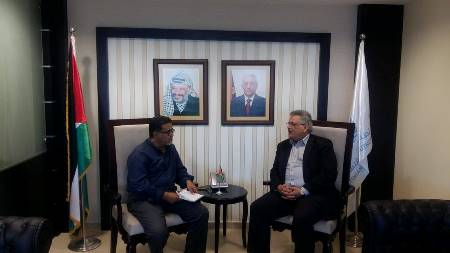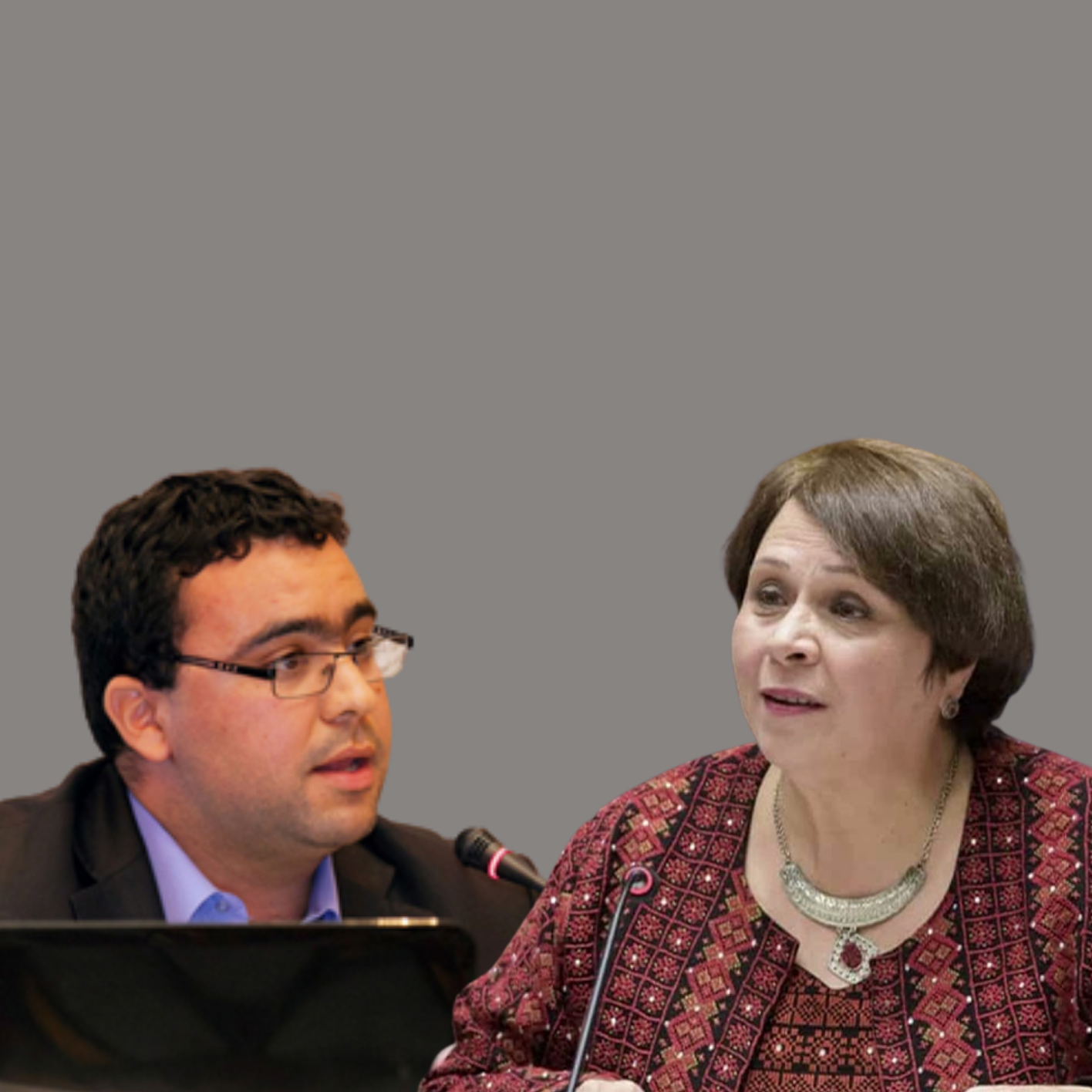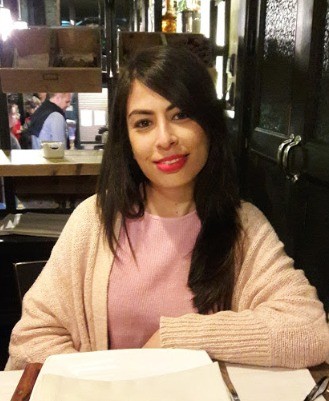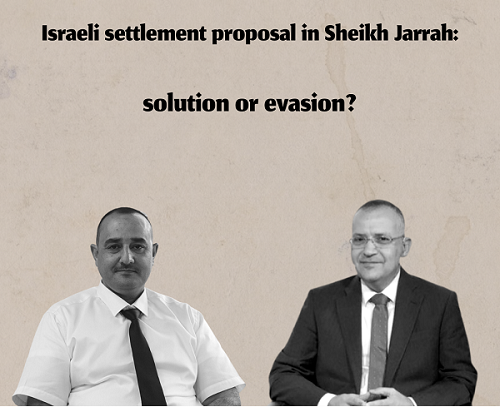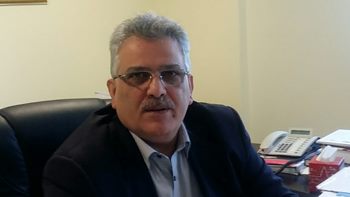
Introduction
Head of the Palestinian Water Authority, Engineer Mazen Ghneim, stressed on the importance of the recently signed agreement with Israel. He said the functions of Joint Committee on water were revised in line with a new mechanism that allows the PA to carry out projects to improve, develop and build water networks in all built-up areas, including in Area C.
In an interview with “Hosted by MIFTAH”, Ghneim said: “The joint water committee’s main goal is to ensure that ground water is not directly affected,” adding that “80% of the work of this committee involves infrastructure projects.”
Following is the full text of the interview:
*You recently signed an agreement on a new operational mechanism for the joint Palestinian-Israeli water committee. What are the circumstances that led to this agreement?
This is a new mechanism for revising the functions of the joint water committee, formed in accordance with Article 40 of the Oslo Accords and which addresses this committee and its authorities in matters regarding water in the West Bank. This was before the committee halted its work between 2010 and 2011 because of projects submitted by the Palestinians to the Israeli side. The latter was submitting projects for settlements, which was unacceptable to us. We rejected them, which at the time led to the halt of the committee’s activities, which adversely affected the Palestinians only. At the time, we had submitted 97 projects. The Israelis were not affected at all by the halt of the committee’s activities given that Israeli settlements in the West Bank, which are illegal according to international law, are already equipped with all their water needs, whether in terms of quantity, supply or new and advanced networks. What’s more, they do not have water losses like us. However, the projects they submitted at the time were aimed at legalizing settlements and settlement activity. Still, they did not succeed in getting a political concession from us in this regard or in creating new facts on the ground because we completely rejected their proposition.
Hence, efforts were made to find a new mechanism for the joint water committee. We held a meeting with the Israelis, which they called an ‘introductory meeting” during which we wanted to find way to serve our people, alleviate their suffering and reinforce their steadfastness without resorting to the language of slogans. We wanted to provide services in the fields of water, health, education, electricity and roads to strengthen the people’s steadfastness and therefore be able to confront the occupation’s measures to expropriate more land to build settlements.
During the meeting, we tried to focus on the goal of the joint committee, which is not to allow ground water to be directly affected. At the beginning, the proposal was to decrease the committee’s work by 80%-85%, which included infrastructure projects. That is why we decided to exclude all of these projects from the work of the committee. Operations pertaining to wells, additional amounts of water purchased through the committee, water prices and the protocol for cross-border sewage water remained within its powers. We were able to reach this agreement after two years of pressure in this regard. We even requested intervention from members of the US Congress and State Department, former US President Barack Obama and his Secretary of State John Kerry and the EU until we were able to reach an agreement on this new mechanism.
*What does the new mechanism stipulate? What are its returns on the water sector in Palestine?
The new mechanism stipulates that ground wells, the digging of wells, additional amounts of water, the sewage protocol and prices are all to remain within the functions of the committee while the Palestinian Water Authority shall carry out all other projects without the need for approval from the joint committee; it only needs to inform it. It should be noted that the subject of water according to the Oslo Accords did not include classifications of Areas A, B and C. Rather, it was all classified as Area C, even within the major cities, Ramallah and Nablus, for example. Within this mechanism, we turned Area C into A, including all Palestinian localities, whether in A, B or C. This is the first time this has happened. The Israeli side used to object to one stone being placed in any Palestinian village without its knowledge and approval. However, today, the Water Authority can carry out projects in any community in Area C. Previously, donor countries would condition implementation of these projects on obtaining approval from the joint committee. Therefore, I believe one of the most important successes we achieved in this regard is that we put a stop to Israeli occupation measures, which were preventing services from reaching the Palestinians through these projects. Now, water services can be accessed in areas never accessed before. What’s more, we can save the water through these projects.
**You mentioned water losses because of the poor network. How much loss do you estimate and what is your plan to decrease it?
We have water losses of over 33%. Remember, the amount of water we have been receiving since 1996 is the same amount today. Can you imagine that our situation 20 or 22 years ago was better than it is today, even with the population growth over the previous years and the major development in strategic development projects. Nonetheless, our share of water has remained the same all while the old water networks have increased the percentage of water loss, not to mention the shortage of water in the first place. Hence, we seek to overcome this loss through changing the current networks, rehabilitating them and building new ones in addition to building water pipelines. Today, we have the ability to maintain public health and safety through sanitation projects and through upgrading our networks, pipelines and water treatment pumps to maintain a clean environment, preserve our natural and water resources and our public safety. However, in the end I cannot guarantee what the occupation will do or if it will commit or not to our agreement . This is another topic altogether. I cannot predict their intentions, but I can say that my attention and concern is for the Palestinian citizen and to serve and protect the interests of our people irrespective of other issues .
**When does this agreement go into effect and how will it be reflected in the ground in light of the difficult water situation in the Palestinian territories?
This is really related to the exercise of powers. We have already started work in some areas. Meanwhile, we are mobilizing and recruiting the necessary funding to carry out the required projects. There are some micro- projects we implemented, which went well, but this still cannot be considered a yardstick to measure by. The more important test will be in implementing the bigger and strategic projects at a much broader scale than those carried out in the past few months.
**Do you think this new agreement can lay the groundwork for amending other agreements such as the PA’s powers in Area C, especially in terms of Palestinian construction and Israeli home demolitions?
In general, this agreement laid the groundwork for a new phase and a new approach. When I talk about water, remember that water is one of the five outstanding files in the negotiations. The Israelis have realized the strategic significance and goal of a water agreement within the framework of the joint committee where they do not have control over all our water resources, even though Israel is currently in control of 85% of these resources. But if we were able to succeed on the most contentious subject for Israelis, which is water, I think we can score more accomplishments for our people in other areas such as expanding powers in Area C and other areas.
**Have you reached solutions to the attempts by Israeli authorities to impose their own conditions that would allow settlements to benefit from the revised agreement?
In a nutshell, this is about the occupation trying to extract implicit recognition of settlements from the Palestinians . That is why for each Palestinian project, they would condition their approval on getting our approval for projects for the settlements. The truth is, their projects were not that important but had a more political undertone; they had nothing to do with needs or technical projects. All they wanted was recognition from the Palestinians of that the settlements were legitimate. After that, how would we be able to go around saying that settlements are illegal? How would we be able to say that Israel must withdraw from all Palestinian territories occupied in 1967 if at the same time we legitimize their occupation and settlements? That is why we completely rejected this.
*What do you say to those who are criticizing this agreement ?
I have heard lots of criticism. But none of them have anything to do with the interests of our people. They are looking after their own interests. We are much more transparent than any of the people criticizing us. They are very skeptical. They will question anything you do, even if they were thinking about doing the same thing, if only to cast doubt. Our response to them is that there is a national interest and there is also national responsibility towards these issues aimed at serving our people and alleviate their suffering. There is no need to question them.
*Do you have data on the Palestinians’ per capita water consumption as opposed to that of the settlers in the West Bank?
The World Health Organization set the minimum per capita water consumption at 120 liters. In Israel, the consumption is 300 liters, while a settler can have a share of up to 400-800 liters a day. In contrast, the average per capita share in Palestine is 80 liters of water. However, from a practical aspect and because of the decrepit water network in the West Bank, the daily per capita share of Palestinians ranges from between 45 and 50 liters. That is, a settler, who plunders Palestinian water, receives over 10 times more water than a Palestinian citizen. Of course, these are unfair ratios. That is why the agreement was so important, because we could now provide Palestinians with their real share of daily water, which is 80 liters, which is acceptable. However, this bitter political reality and the inability to access communities has prevented us from having sound planning and establishing an integrated and interconnected water system, thereby preventing us from developing this vital sector, which is a humanitarian sector in the first degree.
I think there is a lot of suffering in all sectors, but this sector suffers the most. We are in daily contact with the people, whether through the reforms we conduct to the water sector or through the capacity-building of major institutions and strategic projects, in addition to solving the water problem in the Gaza Strip.
*Tell us about the water situation in Gaza in light of reports warning about the Gaza Strip’s imminent collapse
I can say that approximately 97% of the water in the Gaza Strip is unfit for human consumption. We have a clear plan we are working on, based mainly on halting the current deterioration in Gaza in order to avoid a collapse of this reservoir. If these steps are not taken, according to these reports, it will collapse and Gaza will become a drought zone.
Nonetheless, the water plan for Gaza still stands; it gives priority to halting the contamination through waste water plants. We currently have three waste water plants in the northern, central and southern Strip. Two are in place and the third is being built as a partial solution for the next three years. The principle and strategic solution, however, must be to build a desalination plant in the Gaza Strip with a capacity of 55 million cubic meters and which completely halts the entry of seawater through stopping the drop in the water reservoir. It should be noted that water consumption in the Strip reaches 200 million liters, that is, four times the water stock in the current reservoir. It is a catastrophic situation in the Gaza Strip, to say the least.
We have a small desalination plan which we opened at the start of the year, with a capacity of 7,000 cubic meters. We hope to raise its capacity to 12,000 cubic meters and are ready to begin work on this. But frankly speaking, the water sector in Gaza is largely linked to the electricity sector and the plant is not working because of the continuous power cuts. We also have a waste water plant in the northern Strip that also suffers from these power cuts and overall shortage of electricity, a problem applicable to all water facilities. This of course, causes major damages to Water Authority facilities, which is a danger we are facing today.
The situation is really bad and the occupation is the biggest impediment. We cannot bring in a number of materials including chlorine to sterilize the water. Nonetheless, the leadership and government are making huge efforts to eliminate all obstacles. As part of this, we would like to see citizens as key partners in confronting the crisis created from political realities, most importantly, the occupation’s control over our resources and our inability to benefit from Palestinian water sources. Hence, we are working to manage the limited amounts within our reach through efficient and integrated management. We call on each and every citizen to ration their water consumption. The Water Authority has a guidelines on how to achieve this.
*What about the Red Sea-Dead Sea Agreement signed between Israel and Jordan? Does this agreement recognize Palestinian rights? How can the Palestinians benefit from it?
There are three parties who signed a memo of understanding in 2013. The memo included two agreements: one Israeli-Jordanian, pertaining to the desalination plant in Aqaba and the Israeli-Palestinian agreement which is supposed to have determined the Palestinian water share at 30 million cubic meters from the Israeli network. For the past two years we have been in discussions over this topic. We agreed on a number of issues but there are still some that remain unresolved, including the issue of cost and the permitted water amount. We hope international efforts, particularly from US President Donald Trump, will pressure for the resolution of all the outstanding issues in this regard so we can secure the minimum per capita share of water for Palestinians.
